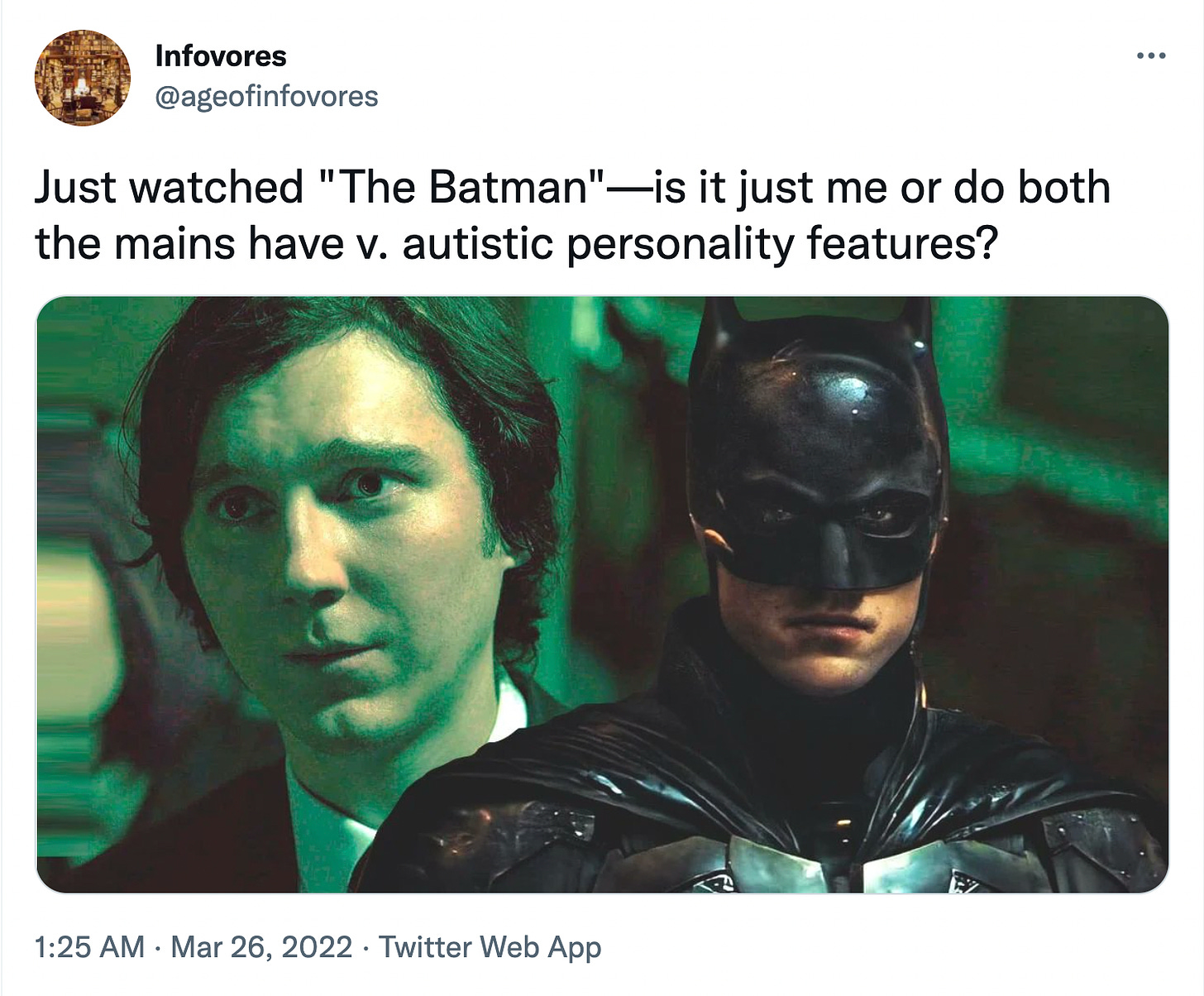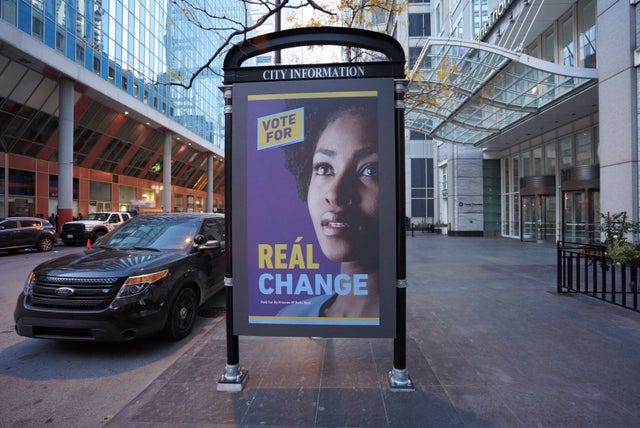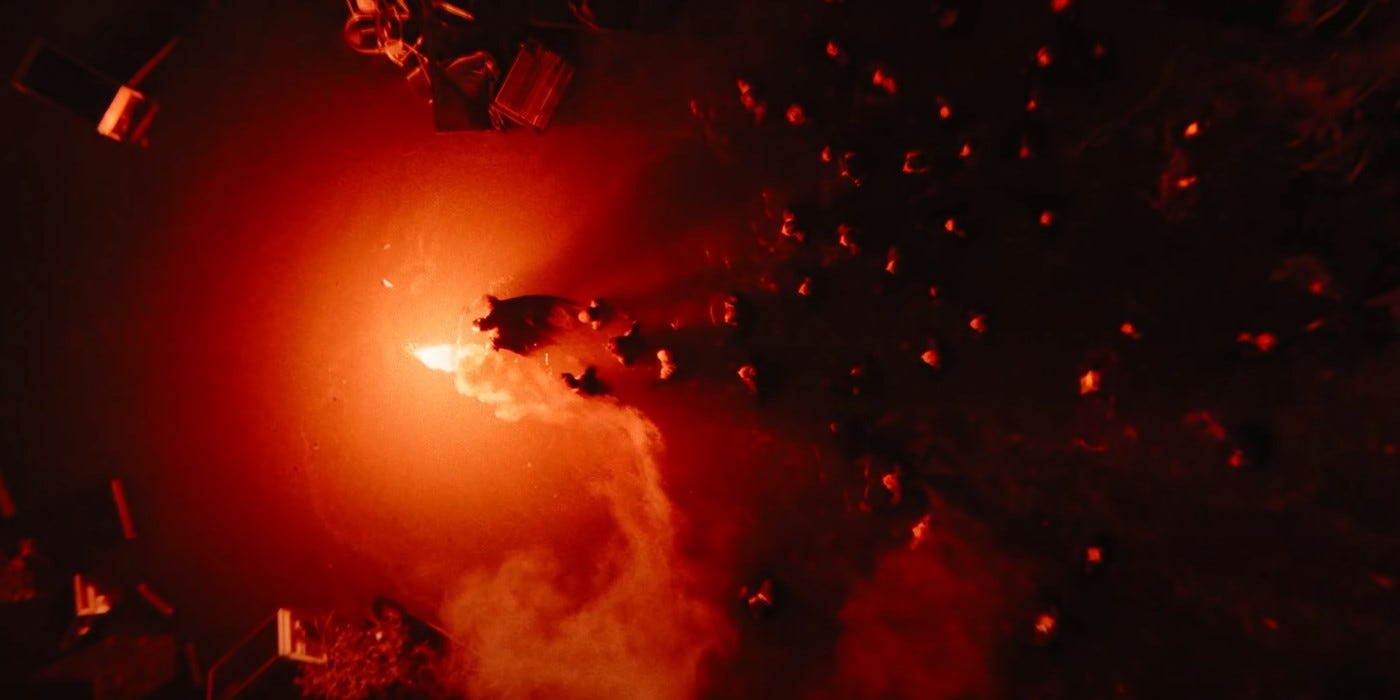Whoever wants to know the heart and mind of America had better learn baseball.
Our culture is so inundated with superhero movies that it’s easy to overlook the ones that actually matter. And while film critics can rightly point to technology and globalization as factors to blame for their box office hegemony, we too often discount the role of superhero stories as a vital medium for talking about America. Indeed the comic book, more so than any other narrative form, is uniquely suited to evolve in tandem with the ongoing development of national identity and purpose in the lives of ordinary Americans.
From this perspective, is it supposing too much to suggest that comic book movie market share in part reflects an unusually pronounced need to address questions of who we are and where we are going as a country? I think not.
They are America’s pastime for a reason.
Superhero on the spectrum
Richard Brody writes of The Batman’s “inability to imagine its superheroes and supervillains with any meaningful psychological identity”, concluding that these “flattened-out heroes” exist to ensure that “no details of personality" distract from the superficial popcorn value of the film. When I watched the film, I too was struck by what I call autistic personality features, though I ascribe greater human richness and significance to them than does Brody.
The Batman and the Riddler display many of the markers of autism, such as inappropriate affect, obsessiveness, and difficulty connecting with others.
Batman has little patience for things that don’t directly interest him (Alfred, stop making me meet with accountants!) and social conventions confuse him (I need to wear links with French cuffs?). The Riddler interacts with the world exclusively through the lens of a very narrow interest (puzzles) and depends on the internet for connection. His livestream appears to be modeled after the videogame network Twitch, which brings to mind evidence suggesting that adults with autism may be “more prone to compulsive video-game use than their typical peers.”
Both keep detailed journals and suffer from insomnia. Bruce seems to experience selective mutism, particularly in situations where he is out in public without a mask.1 In fact, “masking” is itself a term commonly used to describe the way autistics adapt their social behavior in order to avoid negative consequences, often by hiding behaviors they fear will not be understood or accepted.2
This characterization stands in stark contrast to Nolan’s Batman, who was impeccably socially adept. Ironically, it is this previous trilogy’s Wayne who offers the most succinct argument for Matt Reeves’ reimagining of the character—“a guy who dresses up like a bat clearly has issues.”
Disconnection writ large
Batman and Riddler’s autistic traits place them both on the margins of society, unable to fully connect with others in healthy and productive ways. Seeing the world through their eyes affords the viewer a ground-level perspective of Gotham’s problems while drawing attention to the broader theme of societal disconnection.
Consider a few instances of disconnect:
Batman fails to solve a key riddle involving a working class tool, suggesting class division as a primary cause of societal dysfunction.
Gordon is consistently surprised his coworkers are corrupt, indicating that good people are in some sense disconnected from the problems of society because they rarely see its underbelly.
A rough-looking man in the crowd is surprised to notice Bruce has overheard his bitter comment about safety nets, perhaps because social elites so rarely notice people of his station.3
Batman and Gordon misunderstand a clue given in Spanish.
The most important disconnect in the film concerns the characters’ alienation from the political system. A mayoral election taking place in Gotham between incumbent Don Mitchell and challenger Bella Reál transparently invokes the classic divides viewers are familiar with from national politics—Red and Blue, White and Black, Old and Young, etc. Yet there are several indications that these divides are disconnected from what matters to the public.
Mitchell becomes the Riddler’s very first victim, bludgeoned to death as he watches coverage of his earlier debate on television. This suggests a profound dissatisfaction with the entire system, especially considering that in the (over-simplified) context of the film, the two likely correspond to the same party.
Reál’s portrayal appears more sympathetic. She bases her campaign on hope and change and appears to advocate for the people, even scolding Wayne at a funeral about paying his fair share. But consider the likely destination for the money she hopes to exact—the city’s “Renewal Fund”, portrayed convincingly throughout the film as thoroughly corrupt. While she may not be personally complicit, her repeated references to renewal (including at the end of the film) suggest she is at best naive to the scope of Gotham’s decay as perceived by many of her constituents.
In this respect, Bella Reál is clearly intended to invite comparison with Barack Obama, another young black politician who rose to power promising change we can believe in.
Though compelling to many at the time they were delivered in 2008, these messages have since come to be perceived as thoroughly cringe.
Obama has been frequently criticized for being an elitist and an insider, even by a growing faction on the left who feel he was always a little too cozy with Wall Street. Whether these criticisms are fair is debatable, but “The Batman” suggests a similarly cynical attitude toward any political actor more inclined to work within the system than reject it outright.
More subtle evidence strengthens this connection in the form of Reál’s surname, which in Spanish can be used to refer to royalty.4 This clue suggests that to many Gothamites, Reál is herself a ruling class elite and is not to be trusted.
Fix the System or Burn it Down?
“Some men just want to watch the world burn.”
When Alfred uses this iconic line in “The Dark Knight”, it’s to help Bruce understand a worldview that is essentially foreign to him. Nolan’s Batman struggles to understand the destructive impulse because he, like the America he represents, has a clear sense of moral purpose and believes that the system can be saved.
This is not the case for the Reeves’ Batman. Whereas Christian Bale frequently affirms that “there are still good people in this city”, Pattinson evinces little sympathy for the Riddler’s victims who he agrees were “corrupt… [and] crossed the line”. When Gordon remarks that Batman seems to think they had it coming, Pattinson does not refute him.
The two Batmans’ civilian behavior further illuminate this contrast. Though his efforts are not visible to the public, Bale is determined to ensure that Wayne Enterprises is a force for good. He attends corporate board meetings and gains majority control of the company to replace its chief executive with the trustworthy Lucius Fox.
Pattinson is never shown attending to his company, and seldom even appears in public during the day, suggesting a fundamental aversion to operating through traditional channels. When confronted by Reál about his limited philanthropy, Pattinson declines to negotiate with her or even defend his reputation because for him making any effort to engage with the system is a waste of time.
When the Dark Knight released in 2008 (the year of Obama’s campaign), “burn it all down” attitudes were relatively marginal and uncommon. Today they are widespread.5


Since The Batman’s release, I have even seen some speculation about whether the Riddler did anything wrong. Consider the basic argument:
Gotham is depicted as a failed state, with no obvious channel through which the Riddler might successfully report corruption. When he leaks damaging (and apparently true) information via the internet, no forces mobilize to enforce consequences on those implicated. At points he does cross the line by putting innocent civilians at risk (e.g. driving a car through a funeral), but apart from that, isn’t the Riddler justified?
Though I find this chain of reasoning perverse, I think it receives a troubling amount of validation from the film itself. Does “The Batman” convincingly reject this world view in its final act?
Can Gotham be redeemed?
As one of the consequences of the death of God, Friedrich Nietzsche foresaw that people could find themselves stuck in cycles of Christian theology with no way out. Specifically that people would inherit the concepts of guilt, sin and shame but would be without the means of redemption which the Christian religion also offered.
Douglas Murray
Reeves’ Gotham is a world without forgiveness, tradition, or community. This makes the abundant religious iconography of the films’ closing scenes especially striking.
Consider three principal examples:
Strategically placed car bombs detonate around the city, destroying the breakwaters and unleashing a flood of biblical proportions on Gotham.
Batman is submerged deep below the water after a heroic act, reemerging in a symbolic baptism.
Batman lights a flare and leads the Gothamites through the water to safety.
In Nolan’s Batman, such powerful allusions to salvation and deliverance would have been entirely congruent with expressions of faith in transcendent principle shown throughout the trilogy. The “Dark Knight Rises” in particular casts Batman as a Christ figure who, after being literally broken under the weight of Gotham’s corruption, dies and is reborn.
Such elements here however seem oddly dissonant, evoking echoes of past traditions while failing to convincingly ground them in any compelling organizing structure of true belief. Images intended to evoke the memory of our civic faith—Mayor Reál calling for unity at ground zero as Batman aids first responders—likewise come across as reaching for a common language that had real currency in the immediate aftermath of 9/11 but has since become exhausted.
If we consider such contradictions within the film intentional, the apparent contrast between the optimistic messaging of the final act serves only to reinforce the hopelessness of Gotham’s situation. Citizens are too thoroughly alienated to form meaningful connection with one another and a broken political system undermines any possibility of genuine renewal. Politicians may continue to appeal to unity and religious faith when it suits them, but such outward gestures are essentially performative and should be viewed with suspicion.
If there is any remaining hope for Gotham, it lies in the possibility that the film’s perspective is itself distorted by overly identifying with the Riddler’s aggressively disaffected worldview. Little glimpses of this possibility break through at points scattered throughout the film, such as when Alfred avers that the Riddler’s leaked dirt on the Wayne family is misleading or when Gordon arrives in time to rebut Falcone’s claim to control over the police force (“You don’t own all of us”).
While the situation is considerably bleaker in Gotham than in ages past, it appears there are still good people in this city for those inclined to look for them.
Unorthodox comedian Hannah Gadsby has written at length about her ASD diagnosis, which took place in her late twenties. On selective mutism she writes,
“I believe that it is this whirl inside my brain that contributes to my occasional inability to speak. To be clear, I don’t identify as being nonverbal, but I often lose my verbal ability. Especially if I am overwhelmed by a lot of sensory information at the same time as I am trying to identify, process and regulate emotional distress.”
It is worth noting that speaking indirectly (such as in riddles) may also be a sophisticated form of masking. I previously referenced this idea here.
Interestingly he claims to recognize Bruce after a moment, suggesting they are not so different in their relation to society after all.
Recall that misunderstanding Spanish is important elsewhere in the film.
“At Boston College Law School this semester, a constitutional law professor asked students: “Who does not think we should scrap the constitution?” According to a student in the class, not a single person raised their hand.”







This is going to be an intellectual field day. Non-transitive memes abound. https://archive.ph/KJVqH https://archive.ph/jRVgP https://archive.ph/WjUSR
The reason why it is viewed that certain movie characters are great ("kino" "sigma males") is because most of them manifest traits of middle class autism and/or narcissism. Does anyone remember how self-aggrandizing Patrick Bateman is as an upper middle class stock broker? But here is the kicker for the distinction between Batman and Riddler: genuine autists are strong and diligent a-social types, whilst the quasi-autists (might as well call those "ADHD") are more likely to be pro-social vulnerable narcissistic types. If Riddler isn't so socially maladapt he would have been a wordcel bureaucrat (upward looking gentry), and Batman would have been a proper entrepreneur (downward looking elite). https://archive.ph/Dvxsx https://kirkegaard.substack.com/p/wordcel-before-it-was-cool-verbal
As society develops, the corporate leaders gather MOPs and the artists gather narcissistic fanatics. It peaks when the two institutions blends, and dies when narcissism dominates corporate environments and leaders-turned-grifters end the art "scene". Rich wordcels are always the cleansing fires that does the "great reset" for others. https://www.ribbonfarm.com/2009/10/07/the-gervais-principle-or-the-office-according-to-the-office/ https://meaningness.com/geeks-mops-sociopaths http://www.zzzptm.com/lss-002.html https://novum.substack.com/p/elite-overproduction-a-story-of-russia/comments
Moral of the story: Never trust a chinless wordcel accelerationist, but do have fun watching the trainwreck. https://archive.ph/SwWLS https://archive.ph/FIhzc https://archive.ph/yQRmk
> Batman as a Christ figure
Autistic messiah vs Faustian pied piper, anyone? "I have God" vs "I am God"? Thiel's techno-future vs LARP-centric edenism? Introspective heroism vs Liunatic anti-heroism? Or am I just seeing things? https://eggreport.substack.com/p/anti-antiheroism
> optimistic messaging of the final act serves only to reinforce the hopelessness
Thanks for the "courage of hopelessness", bud. This sounds like the same logic as the corporate Shirky Principle: the temporary solution (treatment) justifies the maintenance of the problem (sickness), and further distances oneself from mitigation strategies (cure). This also explains at a world-building level why Penguin is needed, he acts as a Robert Moses Effect of using capitalist incentives to stabilize society. At a personal level it plays out the same way, as Batman needed Joker to NOT die to justify his behavior. https://www.youtube.com/watch?v=OBGswozUpp8 https://www.theifod.com/beware-the-shirky-principle/
Wow. Thank you for this deep exploration. This is so much of what I’m trying to unpack these days with people